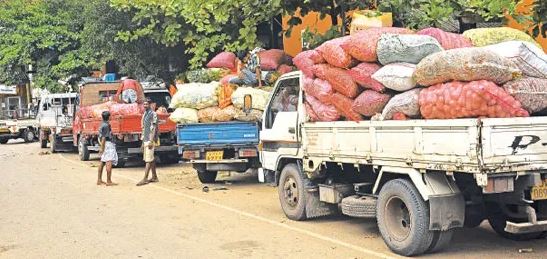Cost of transportation dominated the factors that pushed inflation above 20 percent in 2024.
This, according to the Ghana Statistical Service contributed to food inflation going up due to the high cost of transporting foodstuffs from the farmgate to consumers.
Speaking to Journalists at a workshop to review the consumer price index variables, Data Scientist at the Ghana Statistical Service Simon Tichutab called for a multi stakeholder approach to address the high cost of transporting foodstuffs to the markets.
He stated for example that moving tubers such as yam and cassava from the middle belt of the country to markets in the southern part led to astronomical price increases. The cost, he lamented is always passed on to consumers, leading to food inflation going up.
“If you look at the items, fuel, bus and trotro fares ranked about 70 times in the top fifteen of the 72 data points that we have and a lot of the food items like unprocessed food including yam, fresh tomatoes and other farm produce”, he said.
Describing the situation as a major hurdle that must be addressed, Mr. Tichutab advocated a policy shift to resolve the issue.
“It is a multifaceted challenge and if you ask my view I think if we really want to tackle inflation then we have to look at our food basket and its inflation rates”.
He pointed out that the trend has continued for some years, indicating a pattern that affect food prices.
“Every year, bus and trotro fare is ranked more than necessary which impacts on the prices. We need to check the gap between the market and farmgate and through a stakeholder conversation, there could be a broader approach in dealing with it”, he said.
The Ghana Statistical Service made the disclosure at a stakeholder engagement to review of the 2024 trends of consumer price indices and items driving inflation in Ghana.
The objective of the engagement was to foster a collaborative dialogue among key stakeholders, including government officials and the media on consumer price inflation.
According to the Ghana Statistical Services, the engagement is important to help have a better approach in calculating the inflation rate.
The meeting also highlighted the importance of understanding the complex factors contributing to consumer price inflation which engendered discussion on the development of comprehensive strategies to address the issues. In addition, it focused on key consumable items that have influenced the upward trends in the rate of inflation in Ghana.
The items consistently recording the highest price changes constitute almost a third of average household expenditure.
Latest Stories
-
We’re happy the NPP is resetting to support Mahama in rebuilding Ghana – NDC
6 minutes -
Don’t alienate Kufuor, Akufo-Addo from party, you need them to build strong opposition – NDC tells NPP
9 minutes -
The Rise and Fall of Bedroom Commandos: A National Tragedy in Three Rounds
10 minutes -
Data must be treated as “core infrastructure” to achieve SDG 8 – Government Statistician
25 minutes -
Rugby Africa Cup: Final set for Men’s Rugby World Cup spot as Senegal & Algeria seal wins
36 minutes -
Trump sues Murdoch and Wall Street Journal for $10bn over Epstein article
1 hour -
The entire National Cathedral project is a crime scene – Dr. Arthur Kennedy
2 hours -
Follow Jesus, Follow the Apostles – Bishop Suku Chea charges newly ordained ministers
2 hours -
Bawumia accorded thunderous welcome at NPP conference
2 hours -
Clergymen who soiled their hands in National Cathedral scandal will never be forgiven – Kofi Bentil
2 hours -
National Cathedral: Prosecute those who spent the money – Kofi Bentil
2 hours -
Global HR Icons headline Global Conference on Human Resources in Africa (GCHRA 2025)
2 hours -
Stop the charade, go ahead and prosecute all who misused our money on National Cathedral project – Kofi Bentil
2 hours -
Pick the leader first, let him choose his team – Kofi Bentil to NPP
2 hours -
NPP didn’t sideline Kufuor – Joe Wise
2 hours

